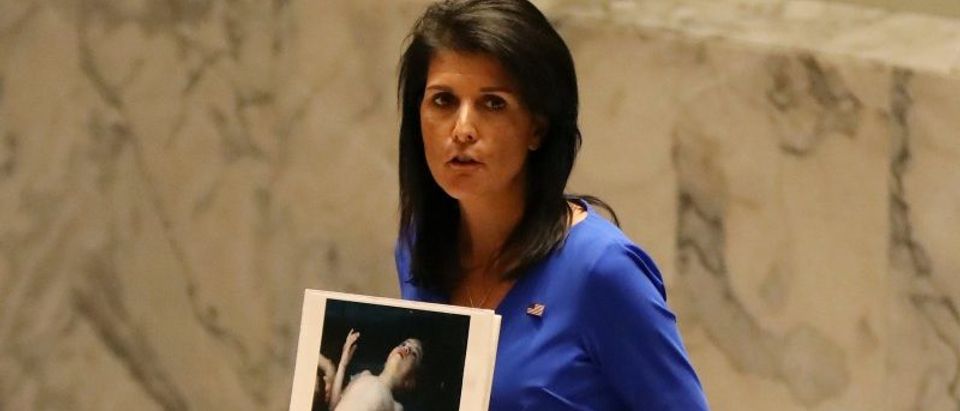Hillary Clinton achieved a victory this week, when President Donald Trump launched airstrikes against the Syrian regime of Bashar al-Assad. No vital interests of the United States or its allies were invoked or involved. A single rationalization sufficed: He did it for the children.
Trump vividly validated the observation of former Secretary of State Henry Kissinger that, “Military missions and foreign interventions are [now] defined as a form of social work.”
Recall that is was during the Clinton years, largely at Hillary’s instigation, that everything from seat belt laws to gun control was rationalized as “for the children.” As liberal columnist Richard Cohen wrote at the time, “Children, it can be fairly said, have been an obsession for this administration.” It was also under Clinton that this obsession reached the dimensions of rationalizing military intervention.
In that case, the attacks were begun with Attorney General Janet Reno, and the targets were American citizens on American soil: the standoff in Waco Texas, when Reno used unsubstantiated child abuse rumors to launch military operations against (to paraphrase the current cliché) “her own people,” resulting in the deaths of 24 children that she was ostensibly protecting. Militarized social work was renewed during the Obama administration, when almost five hundred children were taken from their polygamous parents in the Fundamentalist Church of Jesus Christ of Latter Day Saints without any evidence of abuse. “A night-time raid with tanks, riot police, SWAT teams, snipers, and cars full of Texas Rangers and sheriff’s deputies – that is the new face of state child protection,” wrote attorney Gregory Hession at the time, “social workers backed up with automatic weapons.”
Thankfully, we have avoided placing cruise missiles at the disposal of the social workers, at least until now.
No one denies that protecting children is worthy. Yet when it becomes the sole justification for armies of government functionaries – let alone mobilizing real armies – we may not be getting the full story.
War is where people, including civilians and, yes, children, are killed. Civilian casualties should always be minimized, and operations can be directed at rescuing civilians in danger. How far one nation should invade other people’s countries to protect them from their own governments has become a hotly debated topic. The track record is not good. The fashionable doctrine of “Responsibility to Protect” was invoked to justify Clinton’s bombing of Kosovo and again in the decision to attack Iraq in 2003, though this rationalization was probably gratuitously tagged on. In both cases, it is not clear that we saved any lives, though we took many, and we destabilized these regions in ways we could not predict or control, with consequences to this day.
If Assad did use chemical weapons (apparently still unproven), and if 20 children died as a result, this it was no more lethal than other weapons he and others have used to defend their regimes from armed insurrection – or that we ourselves have used (including on domestic populations). As Trump the candidate recognized, this is not a reason for US intervention or for escalation in which many more innocents could die.
Marco Rubio says that “President Trump has made it clear to Assad and those who empower him that the days of committing war crimes with impunity are over.” But this can never be “clear.” “War crimes” will always be perpetrated with impunity and indeed, with our connivance, because they are notoriously difficult to define and tend to be identified with our political enemies. We regularly turn a blind eye to horrific measures that we and our friends routinely feel justified in undertaking for the sake of military advantage.
What saves lives and protects populations is political stability, something not achieved by constantly trying to undermine established regimes with a quasi-Trotskyist doctrine of permanent revolution. Promoting stability was the strategy we pursued successfully during the Cold War. We were criticized for backing authoritarian regimes who repressed the “human rights” mostly of radical opposition movements. But our authoritarian clients generally left their own populations alone so long as they did not rebel politically. Eventually many became democracies peacefully.
Recall that the Assad regime – now so detested by the left – was itself originally a Soviet client state, and few objected to this or any other “wars of national liberation” which brought so much chaos to poor countries. Bashar al-Assad has behaved much moderately than his father. For one thing, he did not massacre huge numbers of Christians and other religious minorities and drive them from his country, as do the rebel groups we romanticize.
In fact, all this hearkens back to another war of liberation gone bad with our assistance. In our continuing national soul-searching over Vietnam we ignore its main flaw: It was a liberal war, fought as a theater not of the Cold War against Communism (an enemy we could defeat and did) but of the War on Poverty (which we could not and did not win). “Vietnam was the first war in which the United States dispatched its military forces overseas not for the purpose of winning but just to buy time for the war to be won by civilian social programs” writes historian Walter McDougall. “Vietnam was thus the international version of our domestic Great Society programs.… South Vietnam’s cities – like much of inner-city America – soon became corrupt and dependent welfare zones.”
It may be no accident that this policy reversal comes alongside another policy area where Trump has been stymied: his inability to control the budget-busting welfare state – also inherited from the Vietnam years and now the core of Hillary’s constituency. So Hillary’s revenge is that we face the prospects of another quagmire, though this time with zero popular mandate, as it was a war the American people specifically voted against, as Trump asked us to do.


